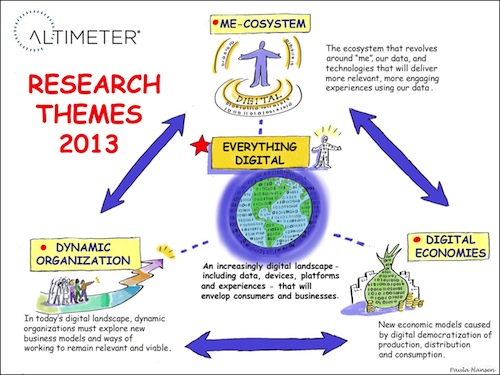
By Altimeter Group’s Research Team
- Analysts: Susan Etlinger, Charlene Li, Rebecca Lieb, Jeremiah Owyang, Chris Silva, Brian Solis
- Consulting: Ed Terpening, Alan Webber
- Researchers: Jon Cifuentes, Jessica Groopman, Andrew Jones, Jaimy Szymanski, Christine Tran
Over 30 Technologies Have Emerged, at a Faster Pace than Companies Can Digest.
If you think social was disruptive, it was really just the beginning. Altimeter’s research team recently convened for our annual research offsite and found over 30 disruptions and 15 trends that have emerged (see below for the full list in our Disruption Database). These disruptions and trends will affect consumers, business, government, the global economy; with accelerating speed, frequency and impact.
Four Major Business Disruptions Emerge – Business Leaders Must Prepare.
Out of these disruptions and trends, Altimeter identified four major themes that will be disruptive to business. Below is a preview of Altimeter’s four business disruption themes, with a definition and short description of each. In the coming weeks, we’ll publish a short report explaining these themes in more detail.
Everything Digital: An increasingly digital landscape – including data, devices, platforms and experiences – that will envelop consumers and businesses.
Everything Digital is the increasingly digital environment that depends on an evolving ecosystem of interoperable data, devices, platforms – experienced by people and business. It’s larger than the scope of Internet of Things, as it’s pervasive or ambient – not defined only by networked sensors and objects, but including capabilities such as airborne power grids or wireless power everywhere. Everything Digital serves as the backdrop for our next three themes.
Me-cosystem: The ecosystem that revolves around “me,” our data, and technologies that will deliver more relevant, useful, and engaging experiences using our data.
Wearable devices, near-field communications, or gesture-based recognition are just a few of the technologies that will make up an organic user interface for our lives, not just a single digital touchpoint. Digital experiences will be multiplied by new screen types, and virtual or augmented reality. Individuals who participate will benefit from contextualized digital experiences, in exchange for giving up personal data.
Digital Economies: New economic models caused by the digital democratization of production, distribution, and consumption.
Supply chains become consumption chains in this new economy as consumers become direct participants in production and distribution. Open source, social, and mobile platforms allow consumers to connect with each other, usurping traditional roles and relationships between buyers, sellers, and marketplaces. Do-it-yourself technologies such as 3D printing and replicators will accelerate this shift, while even currency becomes distributed and peer-to-peer-based. In this new economy, value shifts towards digital reputation and influence, digital goods and services; even data itself. The downside? An increasing divide between digital “haves” and the digital “have-nots.”
Dynamic Organization: In today’s digital landscape, dynamic organizations must develop new business models and ways of working to remain relevant, and viable.
Business leaders grapple with an onslaught of new technologies that result in shifting customer and employee expectations. It’s not enough to keep pace with change. To succeed, dynamic organizations must cultivate a culture, mindset, and infrastructure that enables flexibility and adaptability; the most pioneering will act as adaptive, mutable “ad-hocracies.”
Altimeter’s Disruption Database
Below are the 30 digital disruptions and 15 digital trends, which were used as the starting ground of our analysis.
| Disruptions | Trends |
| 3-D Printing and Replicators App Economy Artificial Intelligence (AI) Augmented Reality (Google Glass) Automated Life (Cars, Homes, Driving, etc.) Automated Robots Bio-Engineering Biometric Authentication (Voice/audio, fingerprint, body/eyescan, gesture, olfactory user interface Content Marketing Digital/Social TV vs. “Second Screen” Emerging Hand Held Devices / Platforms (Android, Tablet, Phablet) Gamification Gesture/Voice-Based Interface/Navigation / “Human as Interface” Hacking/Social Engineering and Information Security Haptic Surfaces (Slippery, wet, textured through electrical currents) Healthcare – Data and Predictive Analytics Human-Piloted Drones Hyper-Local Technology / Mobile Location / Indoor Mapping Internet of Nanoparticles (Embedded in bloodstream) MicroMedia Video Mobile Advertising Mobile Payments Native Advertising Natural Language Processing Near Field Communications Open Source / Open Data / Open Innovation Peer-Based Currency / Soical Currency (BitCoin) Proximity Based Communications Social Engagement Automation (Robots Respond on Twitter) Social Network Analysis, Graphing, and Data Science Social Technologies Touch Permeates Digital/Surfaces: TVs, Touch Advertising Virtual Reality / Immersive 3D Experiences Wearable / Embedded Technology Wireless Power / Electricity |
Big Data Collaborative Economy Connected Workplace Customer Experience Design/Architecture and Integration Data Convergence/Customer Intelligence Data vs Creative in the Org: New Decision Process Digital Ethnography or Customer Journey Mapping Digital Influence and Advocacy Evolution of the Center of Excellence Generation C Hypertargeting Internet of Things or Internet of Everything Intrapreneurship, Innovation Culture, and Innovation Hubs Pervasive Computing Porous Workplace Privacy: Standardization and Regulation (“Beware of Little Brother”) Quantified Self or Human API The Digital Journey and Understanding Digital Signals The Maker Movement The Neuroscience of Digital Interactions |
Open Research: Please Share Your Comments and Insights with Us.
There’s more to come – we’ll be sharing additional insights such as 1) top questions for businesses to ask, 2) who’s disrupted and who benefits, and 3) enabling technologies.
In the meantime, we’re soliciting your comments as part of our Open Research model. Please share our themes with others, and help us answer these questions:
- What other business disruptions or trends are you seeing? Please add to this Google form and we’ll provide proper attribution.
- Which of these four business disruption themes impact your business now?
- How is your business responding to these themes, or the related disruptions and trends?
Photos from Altimeter’s Research Offsite
Below are a couple illustrations that resulted from the discussions that took place at our research offsite:
Above Image: Altimeter synthesized these disruptions and trends, which become broader themes.
Above Image: A graphic illustration of our synthesis. Thank you to Paula Hansen who was instrumental in visually capturing our discussions in real-time.
Reposted from the Altimeter Group blog



